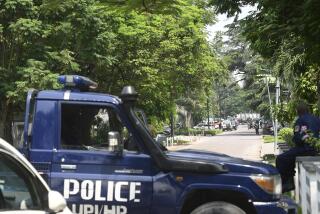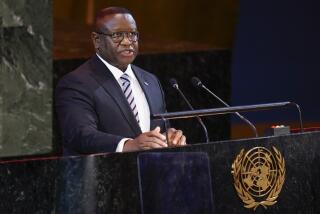Nigeria Troops Stop Rebel Officers in Coup Attempt : Africa: President Babangida says insurgents have been captured. The uprising is blamed on Muslim-Christian tensions.
- Share via
NAIROBI, Kenya — A group of obscure mid-level officers staged a coup attempt Sunday against the military government of Nigeria, but government troops appeared to have quashed the attempt after half a day of heavy fighting in the capital, Lagos.
If successful, the coup would have been the seventh in the contentious country’s 30 years of independence. Nigeria, which with more than 110 million people is the most populous country in Africa, has often been roiled by tribal disputes and by a religious division that pits the Muslims in the north, who hold a slight numerical superiority, against Christians in the south.
Although for most of the day the whereabouts and condition of President Ibrahim Babangida were unknown, he surfaced late Sunday to talk with reporters, the official News Agency of Nigeria reported.
“The unfortunate situation in Lagos this morning has been brought under control,” he said, adding that his military aide, Lt. Col. U. K. Bello, had been among the loyalists slain in the fighting. Most of the rebel leaders have been captured and will be tried, he said. There was no other word on casualties.
The coup plotters evidently harbored grievances against what they perceived to be the Babangida government’s increasing favoritism toward the Muslim north. Early Sunday morning, after rebel troops had seized control of Radio Nigeria headquarters in Lagos, a man identifying himself as Maj. Gideon Oguaza Oka announced over the air that, on behalf of the Christian regions of the “middle belt and southern parts of this country, I wish to happily inform you of the successful ousting of the dictatorial, corrupt, drug-baronish, inhumane, sadistic, deceitful, homosexually centered and unpatriotic administration of Gen. Ibrahim Babangida.”
Oka said the northern states of Borno, Bauchi, Kano, Katsina and Sokoto--all almost entirely Muslim--would be excised from the country and not allowed to rejoin the 21-state federation until they proved their loyalty to the new regime. Northerners working in the south would be forced to return to their homes, he added.
By noon local time, however, the radio station had been retaken by government troops, and a military leader said the coup had been crushed. There was sporadic fighting in Lagos, but it appeared to have ended by nightfall.
In the wake of the coup attempt, the military government moved quickly to allay fears that the plot’s most significant casualty might be Babangida’s plan to return power to civilian control on Oct. 1, 1992.
“No amount of threat or blackmail will distract the government’s attention in this regard,” said Sanni Abacha, chairman of the joint chiefs of staff, in a radio address. “We are set to hand over (power) to a democratically elected government in 1992.”
Like his seven predecessors as leaders of independent Nigeria, Babangida, 49, is Muslim. But over his five years of power, he has shown such finesse at balancing the country’s contentious political and religious interests that an admiring domestic press has dubbed him “the Maradona of politics,” a reference to the wily Argentine soccer player, Diego Maradona.
His broad popular support, enforced by occasional strong-arm tactics, enabled him to impose a harsh economic adjustment program on the spendthrift and heavily indebted country, which is a major oil exporter.
But the economic strictures have reduced the standard of living so much that Babangida’s political support has been draining away.
More to Read
Sign up for Essential California
The most important California stories and recommendations in your inbox every morning.
You may occasionally receive promotional content from the Los Angeles Times.












